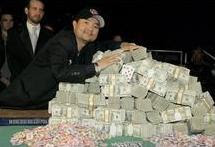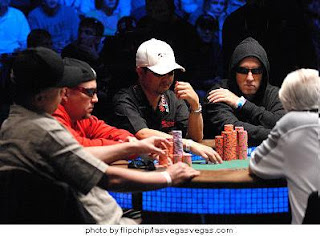Jerry Yang Makes Good
 Let’s see . . . .
Let’s see . . . .On PokerWire Radio’s “Final Table Preview” show, Joe Sebok picked Philip Hilm to win and Jerry Yang to go out in 9th.
Somebody wrote on this blog that the Main Event blind structure would translate into a fast final table. Same guy suggested Lee Watkinson’s early aggression would have a “big influence on how the final table plays out.”
And about 4:30 p.m. Vegas time yesterday, Johnny Chan -- perhaps a bit hopped-up on dozens of cans of his All In energy drink -- said he’d bet “anyone in the world $100,000” the tournament would be over by midnight.
This is why poker is fun. For everyone. (Except, of course, Prahlad Friedman’s opponents.)
Ended up watching the first half of the final table on ESPN’s live stream, then went to bed once they hit the dinner break. Which means I saw the first 91 hands, but only read about the rest this morning. Have to say, those first 60 hands -- during which five players busted out -- were about as compelling as it gets, viewing-wise.
 From the moment he made that UTG raise in Hand #1, Jerry Yang had everybody unsettled -- fellow players, those commenting and reporting, as well as those of us just watching from afar. Sebok’s misfire on his prediction can’t really be criticized. Absolutely no one saw the Yang Express coming.
From the moment he made that UTG raise in Hand #1, Jerry Yang had everybody unsettled -- fellow players, those commenting and reporting, as well as those of us just watching from afar. Sebok’s misfire on his prediction can’t really be criticized. Absolutely no one saw the Yang Express coming. Within the first orbit, Yang had won five pots, including one worth over 11 million when he forced Lee Childs to fold QQ with an all-in flop bet. After starting in 8th place with 8.45 million, Yang had incredibly climbed to over 20 million, not too far from the two chip leaders, Philip Hilm (23.3 million) and Tuan Lam (21.3 million). This barely a half-hour into play.
In Hand #14, Yang opened with a huge raise from the cutoff -- raising to 2.5 million (when the blinds were 120,000/240,000). Chip leader Hilm called him from the big blind, then also check-called Yang’s 3 million-chip flop bet. When Yang pushed on the turn, Hilm finally let it go. Yang had vaulted into the chip lead, cracking 25 million.
Yang had tripled his starting stack, winning six of the first 14 hands. And, most importantly, he hadn’t shown a single hand. This factor was key, I think. No one had the first clue whether Yang had been hit over the head with the deck or was full of applesauce.
He finally did have to showdown the next hand, but it was worth it. Perhaps a bit steamed from the previous hand, Hilm tried to put Yang to the test with an all-in push on a



 board. Yang fretted for a bit, but made the call with
board. Yang fretted for a bit, but made the call with 
 . Hilm had
. Hilm had 
 , and when the river didn’t help him the chip leader was suddenly out in 9th. Yang, meanwhile, was up close to 45 million -- over twice second-place Lam’s stack.
, and when the river didn’t help him the chip leader was suddenly out in 9th. Yang, meanwhile, was up close to 45 million -- over twice second-place Lam’s stack.More wackiness ensued. Just a few hands later, Lee Watkinson tried to make a stand with A7-offsuit and got called (and eliminated) by Yang’s A9. I did expect Watkinson to be aggressive early, although I didn’t necessarily think he’d settle for a hand as vulnerable as A7 with which to make his move. Two hands after that, Yang called Lee Childs’ all-in and found his

 dominated by Childs’
dominated by Childs’ 
 . An eight on the turn gave Yang the hand, however, and three orbits into the final table Yang had over 60 million in chips.
. An eight on the turn gave Yang the hand, however, and three orbits into the final table Yang had over 60 million in chips.Hevad “Rain” Khan went out in 6th after a dubious push with

 versus Yang. Yang showed his inexperience on that hand, nearly turning over his pocket jacks preflop even though all of the chips weren’t in as yet. His JJ held up, though, and Khan was out.
versus Yang. Yang showed his inexperience on that hand, nearly turning over his pocket jacks preflop even though all of the chips weren’t in as yet. His JJ held up, though, and Khan was out. Englishman Jon Kalmar then lost an AK-vs.-JJ race with South African Raymond Rahme to go out in 5th. A little while after that, I hit the hay. When I did, Yang had over 71 million in chips, while his closest competitor (Rahme) had 33.2 million.
Took over a hundred hands for the next bust out to occur, when Russian Alex Kravchenko’s AK lost out after Yang flopped a set with his pocket eights. Kravchenko had been the short stack at the beginning of the night, and did a fine job to improve all of the way to fourth place.
Just two hands later, Rahme would give all of his chips to Yang when he decided to push an ace-high flop with KK, only to be called by Yang’s

 . Heads-up play began with Yang holding over 104 million chips to Tuan Lam’s 23 million. They’d battle for 36 hands.
. Heads-up play began with Yang holding over 104 million chips to Tuan Lam’s 23 million. They’d battle for 36 hands.  On the decisive hand, Lam decided to push it all in with
On the decisive hand, Lam decided to push it all in with 
 , and Yang called with
, and Yang called with 
 . The flop brought Lam some help --
. The flop brought Lam some help -- 

 -- and it looked as though the Canadian might be back in contention. The turn was the
-- and it looked as though the Canadian might be back in contention. The turn was the  , giving Yang a few more outs with an inside straight draw. That draw hit, as the
, giving Yang a few more outs with an inside straight draw. That draw hit, as the  gave Yang the pot and the Main Event bracelet.
gave Yang the pot and the Main Event bracelet.As I said, I only watched the first half of the final table, so I’m looking forward to seeing the rest sometime down the road. A lot has already been made of Yang’s relative inexperience as a player, as well as his openly-avowed Christian faith. He comes across as a very likable, humble guy in his post-tourney interview on PokerNews, and I do think he’s already positioned himself well to take on the task of “poker ambassador” that gets thrust upon the winner each year. He’s already made clear his intention to donate 10% of his winnings to the Make-a-Wish Foundation, Feed the Children, and the Ronald McDonald House.
I was fairly ambivalent about Jamie Gold following last year’s final table, not really caring one way or the other how well he “represented” poker. Have to say I feel a little differently this time around. I’m sincerely rooting for Yang -- for his sake and ours.
That Yang is an amateur doesn’t bother me a bit. Can’t really understand why non-professional poker players feel as though having a pro win the Main Event is somehow “good for the game” -- the last five years have proven pretty decisively that the opposite is the case. Neither do I mind a guy professing his faith the way Yang does, as long as he doesn’t become overly evangelical about it.
Of course, the mischievous side of me likes the idea of man of faith -- indeed, one who potentially will wield some influence here -- out there endorsing poker. As Barney Frank pointed out at last month’s hearing before the House Financial Services Committee, “there is a moral disapproval of gambling” among many lawmakers and others. That moral disapproval is why the UIGEA became law last fall. That moral disapproval is also the single greatest factor determining the fate of future legislation designed to combat the UIGEA.
In his PokerNews interview, Yang directly countered moral objections to poker -- quite eloquently, I thought:
“I think we all should support poker,” said Yang. “Some people play poker professionally; they play for a living. And there is nothing wrong with that. And [if it is] something that we can do to support our family and to support our community and do something good, [then] we all should join together and fight for [our] right [to do it], and do something good about it.”
The man makes sense.
The Main Event winner -- particularly if an amateur -- is always an easy target on forums and blogs. It is human nature to respond to another’s success by trying to lessen its significance. Thus it is almost axiomatic that Yang’s “luck” will be emphasized over his “skill” by many in the coming weeks. Indeed, that was certainly a lucky river card on the last hand. And we know from Yang’s own self-analysis of his play that he enjoyed a few other moments of good fortune along the way. But you don’t wade through over six thousand opponents without some idea of how to play.
Still others will direct their criticism toward Yang’s belief that his Main Event success is somehow connected to his faith. Again, we’re talking human nature here -- that which we don’t understand, we dismiss. But these jabs (already fairly prevalent on the forums) are even less constructive than are semi-resentful cries of “luckbox.” As an existentialist, I believe each person makes his or her own meaning of the world. So I’m certainly not going to deny the champ his understanding of what happened last night.
All of which is to say, having Jerry Yang as champ is just all right with me. Oh yeah.
Labels: *high society














1 Comments:
Fancy a link exchange?
snoops
Post a Comment
<< Home